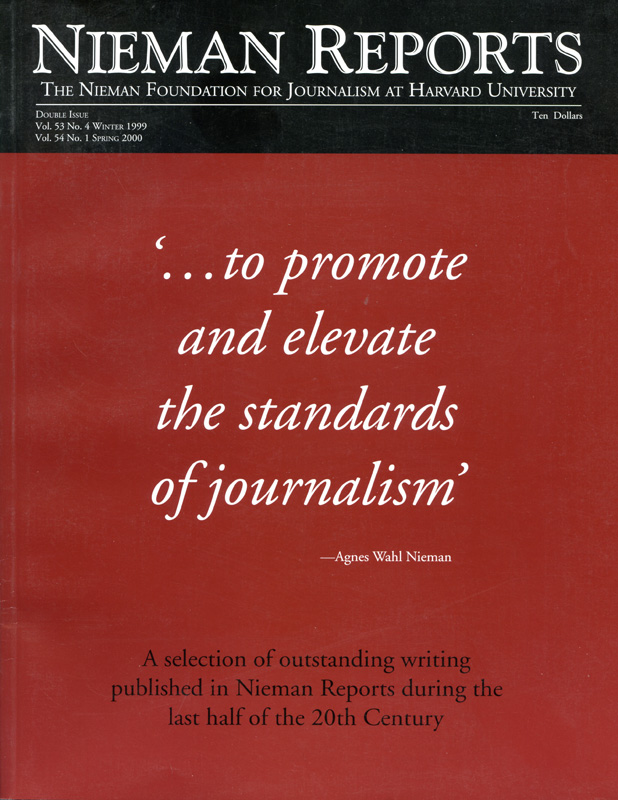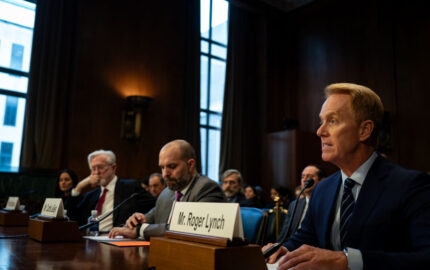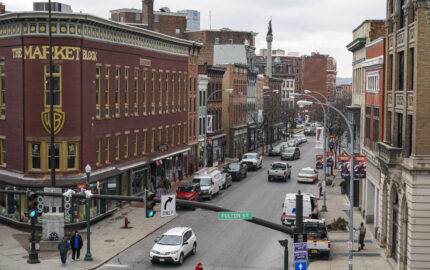[This article originally appeared in the Summer 1985 issue of Nieman Reports.]
…For different reasons, both our elected leaders and most political scientists have been slow to see the crucial connection between mass communications and their laments about dying parties, fragmented power, and failing governmental institutions. Even a Washington veteran like Lloyd Cutler admits it came as “a distinct surprise” when he got into the White House and saw “how much television news had intruded into both the timing and the substance of policy decisions that an American President is required to make.”
“Television news,” he said, “now has a much greater effect on national policy decisions—especially foreign policy decisions—than print journalism has ever been able to achieve and more than most experienced observers realize.… Mastering the art of television presentation is now critical to governance.”
His underlying point—and the one I want to make—is that television is not just another page in media history, the son of radio, that requires some social notice but no significant institutional adjustment. It is an utterly unique phenomenon that is profoundly influencing everything we do—how we act, how we think, how we see the world, how we govern. It is altering and distorting our perceptions of reality and, together with computers, not only expanding knowledge but also changing its very nature.
So it is more urgent than ever before to address two questions which a prescient T.S. Eliot posed more than 50 years ago:
“Where is the wisdom we have lost in knowledge?
“Where is the knowledge we have lost in information?”
Where indeed? Because we are confronted with a dangerous paradox—the fact that the greatest outpouring of new knowledge in all of human history is undermining the very wisdom it is supposed to serve. Mass information—hurled at us by powerful media, twisted into new forms by television and computers—is democratizing knowledge the way higher education was democratized after World War II. But it is also diminishing our capacity for the rational analysis and deliberative judgment on which public wisdom depends and on which effective government depends.
How is our knowledge being changed? How are our perceptions and our thinking processes being affected? In a number of ways:
First, television alters the prisms through which we see the world. The most distant events are swept inside our personal horizon, broadening our “affections,” to use Hamilton’s phrase, beyond family cultures—from the Super Bowl here to great human disasters in India or Ethiopia.
We no longer have to manufacture our own images out of aging words and older pictures. Real-time experiences are delivered into our living rooms, in pulsating color, so that we can share vicariously in the daily triumphs and tragedies of the human race. The result is a new kind of knowledge that is existential and impressionistic, immediate and global, that artificially extends our human linkages and changes the mix of our personal responses. It is also an evanescent knowledge in which images flicker for only an instant on the mind’s screen and then disappear while other images crowd in.
Second, the very process of thinking and deciding is altered. In written communication, the words stand passive and still on the page, never moving. The imagination must work to convert them into individual versions of reality, and then the mind has to take over and reason its way toward conclusions and action. The progression is from words to reason, to conviction, to action.
In the case of television, on the other hand, movement, sound and color rush actual experiences directly to the senses, producing instant emotional reactions, as we saw after the bombing of the Marine barracks in Beirut. There is no need for verbal translation or rational interpretation. The process moves from image to impression, to emotional impulse, and then to action. Sensation and emotional intensity dominate. The reflection and reasoning, which verbal communication demands, are bypassed.…
A third point about television’s effect is that it necessarily distorts knowledge because it must be centered on visual events—action that can be photographed and issues which can be both dramatized and simplified. It cannot deal with subtle, complex and abstract subjects that lie beyond the camera’s beady eye.…
Fourth. Flashing television images mobilize popular feelings on a massive scale never seen before and with stunning speed. The historian Richard Wade believes Japan would have surrendered much sooner if our atom bomb test had been televised for the Japanese people. Scenes of Bull Connor’s swinging clubs applied the public prod that finally launched Kennedy toward civil rights reforms. Television helped to end the Vietnam War and to reverse administration policy in Lebanon. It instantly popularized the invasion of Grenada, making a laughing stock, by the way, out of a lot of carping television pundits who completely misjudged the American mood. As Jody Powell chortled later, “It was sometimes difficult to tell which the American people enjoyed more, seeing the President kick hell out of the Cubans or the press.”
When television is in its natural element, transmitting real events in real time, it can be superb. Very often, however, it has a disruptive effect, amassing emotions and generating demands for action that frequently run ahead of a government’s ability to respond as, for example, in the so-called “revolution of rising expectations.”
Fifth. Like television, but in a different way, computers are also changing the way knowledge is applied to public problems. One example is the pressure for concrete facts and quantifications. Another is the bias in favor of machine-storable data as opposed to abstractions and subjective analysis. Just as Leonardo da Vinci once sought mathematical formulas for human proportion, so man is now hugging his computers in hopes he can quantify all of human life. Reflection and reasoning are neglected.…
A sixth and final note about television’s effect on our thinking is that the sheer volume of information overwhelms the brain’s capacity for absorption, selection and interpretation. The rat-a-tat-tat of the news shows—headlines and weather, weather and headlines…fires, murders and taxes…hijackings and nuclear talks. Everything is repeated endlessly, motion and image chopped into tiny pieces, like diced ham, but impossible to digest. Again, analysis and judgment are the victims.…
These changes in the nature and uses of knowledge have enormous consequences, not only for public wisdom, in the theoretical sense, but for the practical business of making our democracy work. To begin with, television and the mass media have altered the basic relationship between the people and their government by giving voters instant access to the same information being received by their elected representatives. This produces instant mass emotions, instant mass opinions, and then mass pressures which force policymakers to act without prior thought and against their private best judgment.…
The national media are now no longer just observers and messengers but lead actors in government, creating, shaping and often distorting the informational base of decision-making, magnifying as well as reporting the conflicts of power, advocating, nagging and harassing as well as explaining. They are the targets of manipulation by every party to every issue, the objects of guile and deception, the victims of conflicting pressures, witting and unwitting participants in the management of crisis and in the formation of policy, both the collaborators and adversaries of government.
The ability of the press to mold public opinion is now so great that issues and events are often shaped as much to serve the medium’s needs as to promote the general welfare. Newsmakers modify their behavior, creating controversy on demand, turning away from debate and petition in favor of protest and demonstration. Manufactured issues and synthetic facts are created in profusion. They carom against reality, often displacing truth, in an endless contest for media impact and public favor.…
“The most harmful effect of television news,” says Cutler, the insider who has been the most outspoken on the subject, “is its tendency to speed up the decision-making process on issues that television is featuring and to slow down and interrupt the process of deciding other important issues that get less television attention. Whatever urgent but less televised problem may be on the White House agenda on any given morning, it is often put aside to consider and respond to the latest television news bombshell in time for the next broadcast.”
The result, most often, is immediate, frenetic action rather than careful thought or long-range planning. Policymaking is essentially reactive, specializing in fire control. It is not prospective, seeking out the causes of crises before they occur with the novel ambition of preventing at least some of the calamities which befall us. It is a system that invites the ambushes of history in which we are so frequently trapped.…
What can be done about all this? Anyone who raises problems is supposed to have solutions. That is the American way.…
Among other things, I would specifically recommend a new kind of journalism—“ preventive journalism” as opposed to the popular investigative journalism—that would approach the world in a very different way from what the press does now. Instead of only describing the ruins that follow disaster, preventive journalism would search in advance for the hidden forces of change; it would try to identify the underlying causes of crises before, rather than after, they explode so that an alerted society might have time to protect itself from the ambushes of history. It is not enough for the media to provide the videotapes of war; they should also patrol ahead to uncover the hissing fuses.
This would require a different mindset and new techniques. It would mean looking deeply into societal trends on a sustained, long-term basis, so that the public can see and hear the grinding gears that precede the crises which the media eventually cover so fully. To their credit, The New York Times and the Los Angeles Times are doing some of this kind of reporting. But television and most newspapers are still dominated by an action-reaction mentality. And that is a worry.…
Michael J. O’Neill, former President of the American Society of Newspaper Editors, gave the above annual Carlos McClatchy Memorial Lecture, sponsored by Stanford University’s Department of Communication. Mr. O’Neill was Editor of the New York Daily News from 1975 to 1982; he has been a journalist for 30 years.
…For different reasons, both our elected leaders and most political scientists have been slow to see the crucial connection between mass communications and their laments about dying parties, fragmented power, and failing governmental institutions. Even a Washington veteran like Lloyd Cutler admits it came as “a distinct surprise” when he got into the White House and saw “how much television news had intruded into both the timing and the substance of policy decisions that an American President is required to make.”
“Television news,” he said, “now has a much greater effect on national policy decisions—especially foreign policy decisions—than print journalism has ever been able to achieve and more than most experienced observers realize.… Mastering the art of television presentation is now critical to governance.”
His underlying point—and the one I want to make—is that television is not just another page in media history, the son of radio, that requires some social notice but no significant institutional adjustment. It is an utterly unique phenomenon that is profoundly influencing everything we do—how we act, how we think, how we see the world, how we govern. It is altering and distorting our perceptions of reality and, together with computers, not only expanding knowledge but also changing its very nature.
So it is more urgent than ever before to address two questions which a prescient T.S. Eliot posed more than 50 years ago:
“Where is the wisdom we have lost in knowledge?
“Where is the knowledge we have lost in information?”
Where indeed? Because we are confronted with a dangerous paradox—the fact that the greatest outpouring of new knowledge in all of human history is undermining the very wisdom it is supposed to serve. Mass information—hurled at us by powerful media, twisted into new forms by television and computers—is democratizing knowledge the way higher education was democratized after World War II. But it is also diminishing our capacity for the rational analysis and deliberative judgment on which public wisdom depends and on which effective government depends.
How is our knowledge being changed? How are our perceptions and our thinking processes being affected? In a number of ways:
First, television alters the prisms through which we see the world. The most distant events are swept inside our personal horizon, broadening our “affections,” to use Hamilton’s phrase, beyond family cultures—from the Super Bowl here to great human disasters in India or Ethiopia.
We no longer have to manufacture our own images out of aging words and older pictures. Real-time experiences are delivered into our living rooms, in pulsating color, so that we can share vicariously in the daily triumphs and tragedies of the human race. The result is a new kind of knowledge that is existential and impressionistic, immediate and global, that artificially extends our human linkages and changes the mix of our personal responses. It is also an evanescent knowledge in which images flicker for only an instant on the mind’s screen and then disappear while other images crowd in.
Second, the very process of thinking and deciding is altered. In written communication, the words stand passive and still on the page, never moving. The imagination must work to convert them into individual versions of reality, and then the mind has to take over and reason its way toward conclusions and action. The progression is from words to reason, to conviction, to action.
In the case of television, on the other hand, movement, sound and color rush actual experiences directly to the senses, producing instant emotional reactions, as we saw after the bombing of the Marine barracks in Beirut. There is no need for verbal translation or rational interpretation. The process moves from image to impression, to emotional impulse, and then to action. Sensation and emotional intensity dominate. The reflection and reasoning, which verbal communication demands, are bypassed.…
A third point about television’s effect is that it necessarily distorts knowledge because it must be centered on visual events—action that can be photographed and issues which can be both dramatized and simplified. It cannot deal with subtle, complex and abstract subjects that lie beyond the camera’s beady eye.…
Fourth. Flashing television images mobilize popular feelings on a massive scale never seen before and with stunning speed. The historian Richard Wade believes Japan would have surrendered much sooner if our atom bomb test had been televised for the Japanese people. Scenes of Bull Connor’s swinging clubs applied the public prod that finally launched Kennedy toward civil rights reforms. Television helped to end the Vietnam War and to reverse administration policy in Lebanon. It instantly popularized the invasion of Grenada, making a laughing stock, by the way, out of a lot of carping television pundits who completely misjudged the American mood. As Jody Powell chortled later, “It was sometimes difficult to tell which the American people enjoyed more, seeing the President kick hell out of the Cubans or the press.”
When television is in its natural element, transmitting real events in real time, it can be superb. Very often, however, it has a disruptive effect, amassing emotions and generating demands for action that frequently run ahead of a government’s ability to respond as, for example, in the so-called “revolution of rising expectations.”
Fifth. Like television, but in a different way, computers are also changing the way knowledge is applied to public problems. One example is the pressure for concrete facts and quantifications. Another is the bias in favor of machine-storable data as opposed to abstractions and subjective analysis. Just as Leonardo da Vinci once sought mathematical formulas for human proportion, so man is now hugging his computers in hopes he can quantify all of human life. Reflection and reasoning are neglected.…
A sixth and final note about television’s effect on our thinking is that the sheer volume of information overwhelms the brain’s capacity for absorption, selection and interpretation. The rat-a-tat-tat of the news shows—headlines and weather, weather and headlines…fires, murders and taxes…hijackings and nuclear talks. Everything is repeated endlessly, motion and image chopped into tiny pieces, like diced ham, but impossible to digest. Again, analysis and judgment are the victims.…
These changes in the nature and uses of knowledge have enormous consequences, not only for public wisdom, in the theoretical sense, but for the practical business of making our democracy work. To begin with, television and the mass media have altered the basic relationship between the people and their government by giving voters instant access to the same information being received by their elected representatives. This produces instant mass emotions, instant mass opinions, and then mass pressures which force policymakers to act without prior thought and against their private best judgment.…
The national media are now no longer just observers and messengers but lead actors in government, creating, shaping and often distorting the informational base of decision-making, magnifying as well as reporting the conflicts of power, advocating, nagging and harassing as well as explaining. They are the targets of manipulation by every party to every issue, the objects of guile and deception, the victims of conflicting pressures, witting and unwitting participants in the management of crisis and in the formation of policy, both the collaborators and adversaries of government.
The ability of the press to mold public opinion is now so great that issues and events are often shaped as much to serve the medium’s needs as to promote the general welfare. Newsmakers modify their behavior, creating controversy on demand, turning away from debate and petition in favor of protest and demonstration. Manufactured issues and synthetic facts are created in profusion. They carom against reality, often displacing truth, in an endless contest for media impact and public favor.…
“The most harmful effect of television news,” says Cutler, the insider who has been the most outspoken on the subject, “is its tendency to speed up the decision-making process on issues that television is featuring and to slow down and interrupt the process of deciding other important issues that get less television attention. Whatever urgent but less televised problem may be on the White House agenda on any given morning, it is often put aside to consider and respond to the latest television news bombshell in time for the next broadcast.”
The result, most often, is immediate, frenetic action rather than careful thought or long-range planning. Policymaking is essentially reactive, specializing in fire control. It is not prospective, seeking out the causes of crises before they occur with the novel ambition of preventing at least some of the calamities which befall us. It is a system that invites the ambushes of history in which we are so frequently trapped.…
What can be done about all this? Anyone who raises problems is supposed to have solutions. That is the American way.…
Among other things, I would specifically recommend a new kind of journalism—“ preventive journalism” as opposed to the popular investigative journalism—that would approach the world in a very different way from what the press does now. Instead of only describing the ruins that follow disaster, preventive journalism would search in advance for the hidden forces of change; it would try to identify the underlying causes of crises before, rather than after, they explode so that an alerted society might have time to protect itself from the ambushes of history. It is not enough for the media to provide the videotapes of war; they should also patrol ahead to uncover the hissing fuses.
This would require a different mindset and new techniques. It would mean looking deeply into societal trends on a sustained, long-term basis, so that the public can see and hear the grinding gears that precede the crises which the media eventually cover so fully. To their credit, The New York Times and the Los Angeles Times are doing some of this kind of reporting. But television and most newspapers are still dominated by an action-reaction mentality. And that is a worry.…
Michael J. O’Neill, former President of the American Society of Newspaper Editors, gave the above annual Carlos McClatchy Memorial Lecture, sponsored by Stanford University’s Department of Communication. Mr. O’Neill was Editor of the New York Daily News from 1975 to 1982; he has been a journalist for 30 years.



